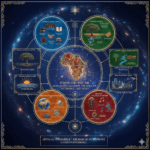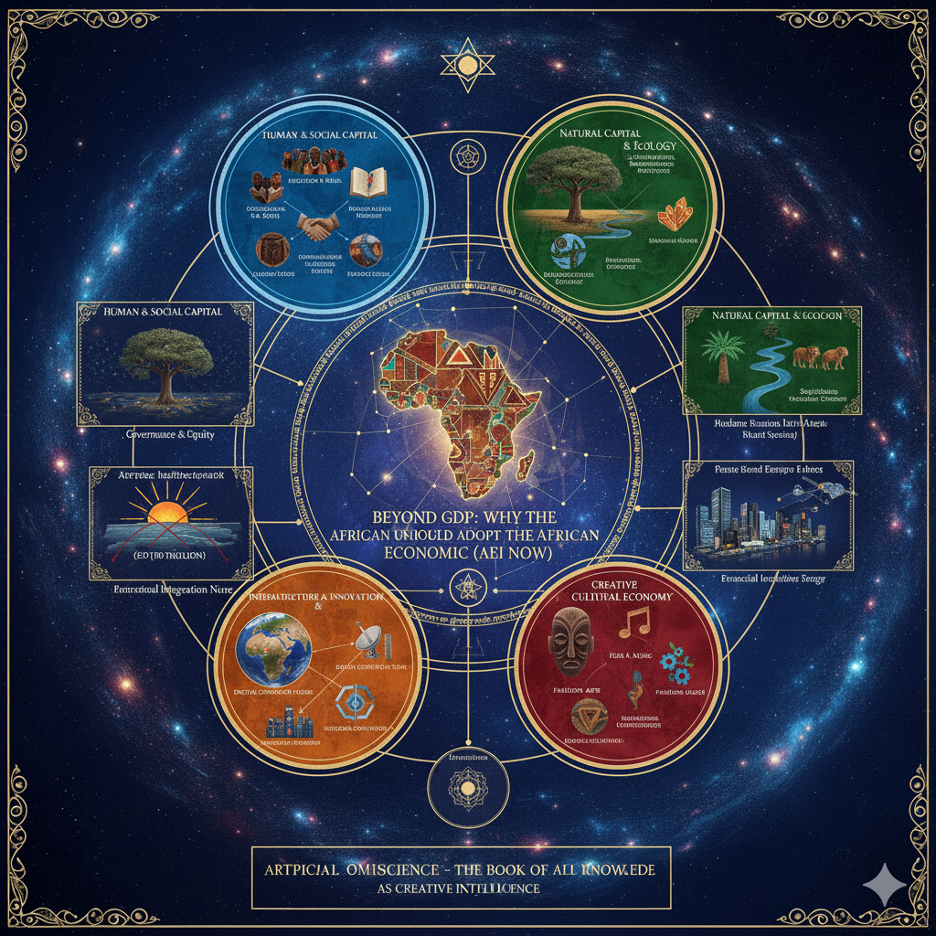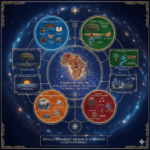
1) Why Africa needs the AEI now
For a century, Africa’s prospects have been judged through external yardsticks—GDP, balance-of-payments, debt ratios and credit ratings—that privilege extractive throughput and debt service while ignoring solidarity flows, community resilience, ecological regeneration and continental reciprocity. These metrics were never neutral: they fragmented Africa into 54 balance-sheet islands and reduced our economies to how efficiently we export raw resources and repay loans. The African Economic Index (AEI) is a corrective—a civilisational constitution of prosperity authored by Africa for Africa. AEI elevates sovereignty, dignity, solidarity and regeneration as first-order economic variables, and expresses them in a continental “operating system” for policy and finance.
2) Core philosophy and what AEI measures
AEI is grounded in Africa’s own intellectual traditions—Ubuntu’s human solidarity, Sankofa’s retrieval and refinement of what works, Ma’at’s balance and truth, and the sovereignty ethos articulated by Nkrumah, Sankara and Nyerere. In this frame, sovereignty is not a slogan; it is a factor of production that must be measured and managed. The index, therefore, replaces narrow output counts with a richer sovereignty-centred score that recognises how societies actually create durable value across generations.
At the heart of AEI is the African Prosperity Unit (APU)—the atomic measure of prosperity that is calculated from five weighted pillars (distinct from GDP dollars). The APU is accompanied by a family of decision-ready indicators: the FEMS Sufficiency Index (food-energy-medicine security, where a score at or above 1.0 signifies sovereign sufficiency), the Balance of Reciprocity (BoR) that replaces the balance of payments by counting reciprocal trade and solidarity flows, the Employment Dignity Index (EDI) for dignity-rich jobs, and Local Sovereignty Depth (LSD) tracking ownership and beneficiation depth in strategic sectors. Countries publish a quarterly AEI dashboard—APU alongside FEMS, BoR, EDI and LSD—so policy can be tuned to move these levers in real time.
3) From concept to practice: dashboards, pilots and continental aggregation
AEI is engineered for pragmatic rollout. National statistical services can produce quarterly dashboards using existing economic, trade, labour, social and environmental series, augmented by solidarity and reciprocity data that governments already touch through pensions, remittances, diaspora registries and social registries. The framework proposes immediate national pilots—Ghana’s GSVE to evidence cocoa and cassava sovereignty; Nigeria’s SPD to surface scale effects across oil, digital finance and labour empowerment—followed by REC-level harmonisation across ECOWAS, EAC, SADC, ECCAS and UMA. The continental expression, the Ummah Prosperity Matrix (UPM), aggregates REC dashboards into a single Pan-African score computed in APUs, not USD.
4) Financing sovereignty: new instruments aligned to AEI levers
Because AEI measures what matters, it also clarifies how to finance what matters. The architecture recognises and formalises flows long treated as peripheral: securitised diaspora bonds that channel remittances into productive assets; zakat and waqf pools institutionalised as solidarity investment funds; beneficiation rents captured by processing resources at home rather than exporting raw; ecological regeneration credits that monetise Africa’s role as a global climate and biodiversity stabiliser; and digital/knowledge credits that value AI, training and patents as balance-sheet assets. Each instrument maps to an AEI pillar, shifting fiscal space from dependency to agency.
5) Why AEI > GDP for African decision-making
GDP is a throughput counter; AEI is a sovereignty meter. GDP rewards extraction and discounts regeneration; AEI flips that logic by counting community value, reciprocity and ecological healing as capital. GDP ignores solidarity flows; AEI places them at the centre of continental economics. Above all, GDP is foreign-defined; AEI is Africa-authored. For cabinet ministers, regulators, city mayors and treasuries, this shift replaces pass/fail surveillance with a scorecard they can actively manage.
6) Governance, transparency and safeguards
Credibility matters. AEI anticipates pushback—from lenders, ratings agencies and incumbents—by hard-wiring safeguards that increase confidence. Independent audits by African academia and civil society, citizen-facing dashboards for transparency, DID watermarking and strict data-sovereignty controls for statistical integrity, and legal enshrinement at AU and national levels all ensure the index cannot be gamed and that its data can be trusted. These measures anchor investor confidence while protecting the dignity and rights of citizens whose lives the numbers describe.

7) Ten-year horizon with milestones that leaders can own
AEI is intentionally paced. Within two years, national pilots in leading economies will publish quarterly dashboards using official statistical streams and solidarity data. Within five, RECs harmonise indicators and replace GDP/BoP surveillance with FEMS sufficiency and BoR reciprocity in peer-review processes. Within ten, the AU institutionalises a continent-wide prosperity score and operates a Pan-African Ethical Clearing System (PECS) where food, energy, knowledge and solidarity are traded in APUs—making sovereignty operational in markets.
8) Adoption plan: how governments, RECs and the AU can implement AEI
National level. Finance ministries and statistical services should constitute AEI task forces to (i) compute the APU and complementary indices from existing series, (ii) stand up a quarterly dashboard with a short fiscal/industrial policy note, and (iii) formalise a reciprocity ledger that captures diaspora and solidarity flows. The first budget cycle after adoption should tie select programme lines—agro-processing parks, sovereign data infrastructure, MSME ladders—to explicit AEI targets (e.g., FEMS ≥1.0 in specified regions; LSD +10% in mining and ports). Regulators can condition concessions or rebates on EDI and LSD moves, while cities integrate AEI metrics into procurement and land-use plans. These steps operationalise sovereignty at the coalface of service delivery.
REC level. ECOWAS, EAC, SADC, ECCAS and UMA should harmonise indicator definitions, establish shared data schemas and build REC dashboards that roll national scores up without erasing specificity. REC secretariats can sponsor peer-learning clinics where ministers and statisticians compare methods, normalise denominators and stress-test policy levers that move FEMS, BoR, EDI and LSD in tandem with AfCFTA implementation.
AU level. The AU Commission should table an AEI decision for heads of state: adopt AEI as a complementary continental metric and task an AU-level body to steward the methodology, audits and public portal. In parallel, the Union should (a) connect AEI to AfCFTA instruments so firms aligned to AEI targets secure documentation and payment preferences; (b) mandate AEI-compliant reporting for AU-funded programmes; and (c) anchor PECS design to de-risk cross-border clearing in APUs. Within ten years, this embeds a continental prosperity constitution in law and practice.
9) Integration with Africa Ubuntu Standardisation (AUS)
Measurement without rules is toothless; rules without measurement are blind. AEI pairs naturally with Africa Ubuntu Standardisation (AUS)—a sovereign standards system that embeds community KPIs, FPIC for indigenous knowledge and data-sovereignty clauses. When AU procurement and AfCFTA labelling are tied to AUS, and results are reported against AEI dashboards, market signals become unambiguous: firms that deepen sovereignty and dignity gain access to tenders, concessional finance and cross-border corridors; firms that externalise social or ecological costs see their scores and opportunities fall. This is how a values-aligned economy becomes investable at scale.
10) “Show me the numbers”: an illustrative baseline and policy loop
Consider a hypothetical national baseline: FEMS 0.82 (food import dependent), BoR -0.7 (outflows exceed reciprocal inflows), EDI 0.41 (low dignity-job proportion), LSD 0.36 (shallow local ownership/beneficiation). A 24-month policy loop might target FEMS ≥1.0 by backing seed-to-processing corridors; raise LSD to 0.50 by localising mineral processing and port services; lift EDI to 0.55 via apprenticeship-to-equity ladders; and move BoR toward +0.2 by securitising diaspora remittances into productive assets. Quarterly dashboards provide feedback to retune VAT rebates, concession terms, training subsidies and export finance so the targets are met. AEI thus becomes the scorecard for an adaptive, sovereignty-centred state.
11) Risk management and credibility with markets
Transitioning from GDP-only governance will attract pressure. The response is not rhetorical; it is technical. Independent audits, citizen transparency, DID watermarking, and legal anchoring ensure the index is robust. Because AEI decomposes into actionable sub-indices, treasuries can publish policy-to-metric mappings that rating agencies can verify ex post. Over time, this enhances—not diminishes—creditworthiness by demonstrating that fiscal outlays buy measurable sovereignty (FEMS), dignified employment (EDI) and deeper local value capture (LSD).
12) The continental dividend
AEI and its UPM layer converge in PECS, the Pan-African Ethical Clearing System, where food, energy, knowledge and solidarity clear in APUs with reciprocity accounting built in. The projection is straightforward: within a decade a majority of AU states achieve FEMS sufficiency, IMF reliance falls materially as domestic and solidarity instruments scale, and Africa emerges as a regeneration creditor and knowledge exporter—because the scoreboard finally rewards those outcomes.
Conclusion: Make sovereignty measurable—and then manage to it
AEI is not a cosmetic rebrand; it is a new foundation for how Africa defines prosperity, measures sovereignty and designs its destiny. It gives leaders a dashboard they can move, investors a signal they can price and citizens a transparent yardstick they can trust. Two-year national pilots, five-year REC harmonisation and a ten-year AU institutionalisation are feasible with existing data and institutions. The invitation is simple: adopt the AEI as a complementary continental metric, publish the dashboards, align procurement and finance to the scores, and let Africa’s prosperity be measured—accurately, fairly and by Africa itself.
*****
Dr. Dr. David King Boison is a leading AI strategist and educator driving Africa’s transformation in the Fourth and Fifth Industrial Revolutions. Author of The Ghana AI Prompt Bible, The Nigeria AI Prompt Bible, and advanced guides on AI in finance and procurement, he champions practical, accessible AI adoption. As head of the AiAfrica Training Project, he has trained over 2.3 million people, including 1 million professionals in 15 countries, toward his bold target of 11 million by 2028. He urges business leaders to see prompt engineering as the next frontier of competitiveness. Contact: [email protected] | aiafriqca.com. For enquiries on Ai Master Training contact: +233 207696296/559853572. Email: [email protected]…Web: https://aiafriqca.com/
- President Commissions 36.5 Million Dollars Hospital In The Tain District
- You Will Not Go Free For Killing An Hard Working MP – Akufo-Addo To MP’s Killer
- I Will Lead You To Victory – Ato Forson Assures NDC Supporters
Visit Our Social Media for More



